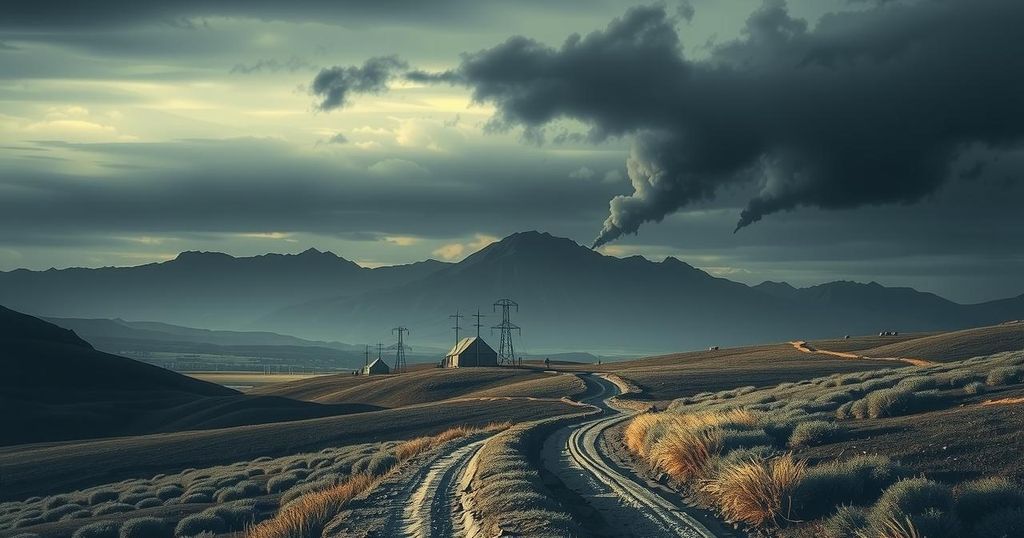The M23 armed group, backed by Rwanda, has vowed to march on the DRC capital Kinshasa after capturing Goma. The situation escalates a long-standing conflict in the region, with international concern growing over Rwanda’s involvement. Congolese President Tshisekedi has promised to combat the insurgents while humanitarian conditions deteriorate as fighting continues.
On Thursday, the Rwanda-backed M23 armed group declared its intention to advance toward Kinshasa, the capital of the Democratic Republic of Congo (DRC), following their takeover of Goma, North Kivu’s capital. This escalation is significant in a region plagued by violent conflict among multiple factions over many years. Rwanda claims its operations aim to eliminate groups linked to the 1994 genocide, although it faces accusations of exploiting the DRC’s mineral resources, crucial for global electronics production.
Corneille Nangaa, leader of a coalition that includes M23, stated, “We will continue the march of liberation all the way to Kinshasa,” asserting that they will remain in Goma until their grievances are addressed. He also promised to restore electricity and security and create humanitarian routes for displaced residents. President Felix Tshisekedi of the DRC responded by vowing to combat the insurgents effectively, referring to them as terrorists and committing to a coordinated military response.
The United Nations expressed deep concern over credible reports of M23’s expansion towards Bukavu in South Kivu province. Local sources indicated that the Rwandan-backed group had gained control over two districts. Following intense violence leaving over 100 dead and hundreds wounded, Goma’s residents are anxious, with some expressing their determination not to live under M23 control.
International responses have intensified, with countries including Angola, China, the EU, France, and the US urging Rwanda to withdraw its forces. The French Foreign Minister met with Rwandan President Paul Kagame after consultations in Kinshasa. Kagame critiqued Tshisekedi at a regional meeting, questioning why leaders allow such a situation to continue. He claimed that M23 comprises Congolese, not Rwandans.
Belgium has suggested the EU consider sanctions against Rwanda, highlighting potential leverage concerning key mineral agreements. Meanwhile, Britain’s foreign ministry announced plans to reassess its aid to Rwanda. As regional tensions escalate, the Southern African Development Community (SADC) has announced a special summit to address the crisis. Kagame underscored that Rwanda is unable to act as a peace mediator, stressing that the situation requires urgent resolution.
As M23 fighters and Rwandan troops took over Goma, local residents faced dire circumstances, with widespread devastation reported. A resident lamented the looting that has left them without food. According to the UN, the conflict has worsened the humanitarian crisis, displacing half a million individuals this month alone. The African health agency warned that ongoing conflicts in eastern DRC, a region susceptible to pandemics, raised alarming health risks, emphasizing the critical need for humanitarian support.
The ongoing conflict in the eastern Democratic Republic of Congo has a complex history, characterized by involvement from various armed groups and regional powers, particularly Rwanda. The M23 insurgency, which resurfaced in 2021, claims to represent local grievances against the Congolese government, while accusations persist regarding Rwanda’s support for these factions to gain access to the DRC’s abundant natural resources. This humanitarian crisis is further fueled by historical tensions in the region stemming from the 1994 genocide in Rwanda, affecting political relations and stability.
The situation in the DRC remains precarious as the M23 armed group’s advances threaten to escalate the conflict and intensify the humanitarian crisis. International pressure mounts on Rwanda to withdraw support for M23, yet the regional dynamics complicate potential resolutions. President Tshisekedi’s commitment to fight back against these insurgents reflects the urgency of the situation, as the humanitarian toll continues to rise. A coordinated response from the international community will be crucial in addressing not only the immediate security concerns but also the underlying issues driving the conflict.
Original Source: www.kten.com




